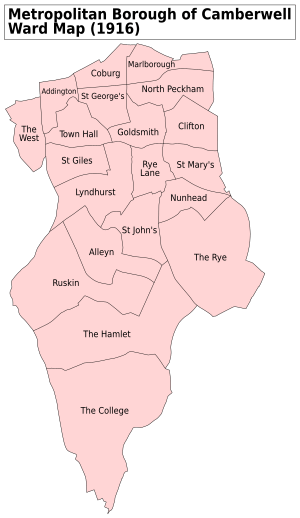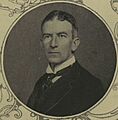Peckham (UK Parliament constituency) facts for kids
Quick facts for kids {{{Name}}}[[{{{Type}}} constituency]] |
|
|---|---|
| [[Image:{{{Map1}}}Constituency.svg|120px|]] [[Image:England{{{Map2}}}.svg|120px|]] |
|
| {{{Name}}} shown within [[{{{Entity}}}]], and {{{Entity}}} shown within England | |
| Created: | {{{Year}}} |
| MP: | {{{MP}}} |
| Party: | {{{Party}}} |
| Type: | House of Commons |
| County: | [[{{{County}}}]] |
| EP constituency: | [[{{{EP}}} (European Parliament constituency)|{{{EP}}}]] |
Peckham was a special area in South London. This area was called a "borough constituency." It elected one person, known as a Member of Parliament (MP). This MP would represent Peckham in the House of Commons. The House of Commons is part of the UK's Parliament.
People in Peckham voted using the "first-past-the-post" system. This means the candidate with the most votes wins.
The Peckham constituency was created for the 1885 general election. It stopped being a constituency in 1997. At that time, it was replaced by a new area called Camberwell and Peckham.
Interestingly, the Peckham constituency will be created again soon. This will happen for the next general election. It will mostly cover the same area as the current Camberwell and Peckham constituency.
Contents
History of Peckham's MP
By the time it was abolished, Peckham was a very strong area for the Labour Party. This means Labour candidates usually won by a large number of votes.
For the last 13 years of its existence, Peckham's MP was Harriet Harman. She later became a very important leader in the Labour Party.
Where Were the Boundaries?
The boundaries of the Peckham constituency changed over the years. These changes happened to make sure each MP represented a similar number of people.
- 1885–1918: It included the North Peckham and South Peckham areas.
- 1918–1950: It covered several wards within the Metropolitan Borough of Camberwell. These included Clifton, Goldsmith, Nunhead, Rye Lane, St Mary's, and The Rye.
- 1950–1974: The area expanded to include more wards in the Metropolitan Borough of Camberwell. These were Addington, Clifton, Coburg, Goldsmith, Marlborough, North Peckham, St George's, St Giles, St Mary's, The West, and Town Hall.
- 1974–1983: The boundaries changed to include wards in the London Borough of Southwark. These were Brunswick, Burgess, Consort, Faraday, Friary, Newington, and St Giles.
- 1983–1997: The final boundaries included the Southwark wards of Barset, Brunswick, Consort, Faraday, Friary, Liddle, Newington, and St Giles.
Who Were the Members of Parliament?
Many different people served as the MP for Peckham over the years. They belonged to different political parties. Here is a list of the MPs who represented Peckham:
| Election | Member | Party | |
|---|---|---|---|
| 1885 | Arthur A. Baumann | Conservative | |
| 1892 | Sir Frederick Banbury | Conservative | |
| 1906 | Charles Clarke | Liberal | |
| 1908 by-election | Henry Gooch | Conservative | |
| Dec. 1910 | Sir Albion Richardson | Liberal | |
| 1922 | Collingwood Hughes | Conservative | |
| 1924 | Hugh Dalton | Labour | |
| 1929 | John Beckett | Labour | |
| 1931 | David Beatty | Conservative | |
| 1936 by-election | Lewis Silkin | Labour | |
| 1950 | Freda Corbet | Labour | |
| Feb 1974 | Harry Lamborn | Labour | |
| 1982 by-election | Harriet Harman | Labour | |
| 1997 | constituency abolished: see Camberwell and Peckham & Southwark North and Bermondsey | ||
Images for kids
See also
- Southwark local elections
- List of parliamentary constituencies in London
 | John T. Biggers |
 | Thomas Blackshear |
 | Mark Bradford |
 | Beverly Buchanan |






